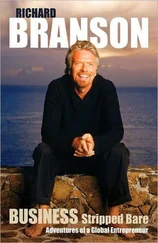Finally, you need to seek out new opportunities, as well as react to those you encounter. At present, population growth and development are linked to increased consumption of natural resources and rising energy needs. Entrepreneurs who take time to inform themselves about the issues will spot opportunities to build new, sustainable businesses for present and future markets. We have set up the Virgin Green Fund to lead our effort and invest in the renewable sector. This is likely to be one of the biggest areas of investment in the next forty years; I hope that in the future Virgin becomes as well known for its activities in these areas as it is for music and aviation today.
There is no prescription for how best to build and expand your business or invest capital. Your choices should depend on your interests and goals, how a new company would fit with yours and on your tolerance for risk. Essentially you should learn to go with your instinct. It takes courage but over the years it has certainly served me well. Bon chance!
By staying small
Meeting with a group of small-business owners recently I was asked, ‘How can we go about laying the foundation for a corporate culture like Virgin’s?’
It’s not a short answer but whether you’re launching a new business or expanding an existing one, laying a solid foundation for the future is critically important-bringing in investors, getting your contracts right, hiring your core team members, choosing the right suppliers. The fact that you are thinking about this question shows that you already have a sense of where your priorities should lie and you’re ready to follow through.
To be honest, when my friends and I started the first Virgin business forty years ago, we had no master plan-especially not one for a group of companies that by 2011 would number more than four hundred businesses around the world and employ 50,000 people. Had we tried to plan for such a future, we would certainly have messed it up.
If there is a ‘right’ way to develop your company’s culture, our experience shows that it should evolve organically. In 1970, my friends and I weren’t planning to do anything other than have a good time while doing something we loved that would hopefully be able to pay the bills. We loved listening to music, so we tried to sell records to other kids who wanted a fun place to hang out while deciding which ones to buy. We had no marketing plan or budget-our goals were simply to make enough money to pay the rent and our suppliers, and to have some cash left over at the end of the month.
Our launch was really no different from that of most small companies, since few entrepreneurs start thinking about their business’s culture until it is already well established. If I think back to what we did right, it was in our planning process, when we made sure we were having fun working together and that everyone who had a good idea was included in our decision-making process. We had accidentally stumbled on the core elements of a culture dedicated to delivering great customer service! It turned out that people who work in a friendly environment that is tolerant of mistakes, and who are empowered to make decisions about how they do their jobs, arrive at the best possible solutions for serving customers.
When you’re sorting out what your front-line colleagues’ priorities should be, remember that how you treat the customer will form the basis of your corporate culture. Put your staff first, listen to them, and follow up on their ideas and suggestions.
Because you can be sure that every person on your staff already has deep insights into what your customers want and what employees need in order to deliver it. Should they focus on delivering solutions tailored to each customer’s needs? On building lasting customer relationships? Or should they quickly deliver the goods or services your company offers? Listen carefully and find ways to empower each person to do a great job. Sir Freddie Laker was famous for his standard response to any staffer who came to him to whine about something: ‘Don’t bring me problems, bring me solutions!’ (He could certainly never be accused of running an autocracy.)
Small-business owners often find it tough to learn how to handle success. When a business does well, many owners/ chief executives start to focus solely on increasing profits, no matter what the cost-leaving behind everything that originally made the business special. The founder usually moves to a big corner office on the top floor and never again sets foot in the factory. Employees who were integral to the company’s early success suddenly find they are the last to know what is happening, and their views are no longer valued or sought.
So try to ensure your company grows at a comfortable pace and, whenever possible, involve your employees in its evolution. If you are a small-business owner mulling over an expansion, tell all your employees about your plan-include everyone from the truck driver to your senior team-and ask for their input. If you can, it would be best to work out the details of the expansion plan together, taking into account the challenges faced by your employees, and incorporating improvements they would like to make. The ultimate winners will be your customers and the bottom line.
At Virgin, we have never had to struggle with the typical problems of big corporations, probably because we never really got big-we just diversified. Our growth was once described as ‘vertical disintegration’ because our new businesses frequently appear to be tangential or even completely unrelated to our core mission. When Virgin was known for producing and selling records, for instance, we started up an airline.
The traditional corporate response to our typical plan for a new business would be ‘I’m sorry, but we’re an XYZ company. That business is not within our core competency.’ But we see a uniting factor in our dedication to customer service. Instead of becoming a huge, bloated entity locked into a single sector, these tangential forays have kept our company fresh and different-we are always learning new businesses and recruiting smart new people. Each Virgin company is run by its own largely autonomous management team that relies on the same small-business principles we’ve employed since the very beginning.
Whatever route you decide to take as you expand your business, make sure that it builds on your company’s past successes, and that it fits with the corporate culture and the vision for the future that you and your team have created.
And when a critic says, ‘That’s not the way a big company would do it’, take it as a huge compliment!
SELLING CUSTOMERS IS EASY
Selling investors is not
Okay, so you have this earth-shattering idea for a new business that you are convinced will create some serious waves, make mincemeat of the competition, and might just make you a fortune along the way.
You’ve checked and rechecked the competition, surveyed all your friends and family on it, drawn up a business plan and assembled a team-this is it-you’re ready to take the leap.
Now comes the hard part.
Securing investment for a venture is a hurdle almost all entrepreneurs have to face, and most do it with extreme of trepidation. It involves spreading the word about your idea, finding prospective investors, and then defending your thesis-often with people with far more experience in the sector or, almost as bad, with idiots in suits who simply don’t get it.
This is one of the most challenging stages for any entrepreneur. So much rides on these meetings-how to get it right? Unfortunately there is no ‘one-size-fits-all’ formula when preparing a pitch for potential investors, but here are a few tips that I have picked up over the years.
Читать дальше












